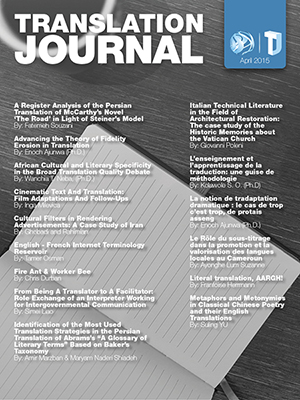July 2015 Issue
Read, Comment and Enjoy!
Join Translation Journal
Click on the Subscribe button below to receive regular updates.
Letter From the Editor
- Details
- Written by Karen Hodgson

The Translation Journal was started over 18 years ago and has been published quarterly ever since. I’ve researched on the web, and I have not found any other online translation and interpreting journal with more years of continuous publication than the Translation Journal. (If you know of one, please let me know!)
As many of you may know, I assumed the role of editor of the Translation Journal just over a year ago. All of the hard lifting involved in creating this publication, including getting the word out and cultivating the impressive reputation that the Translation Journal now enjoys, was done by the founder and previous editor of 17 years, Gabe Boker. As a result, taking over this publication and continuing to produce quarterly issues over this past year has been relatively easy in comparison.
This journal is indispensable to many translators. I know, as I frequently receive letters from translators and interpreters praising how useful and beneficial this publication has been to them. I have heard from translators who have referenced Translation Journal articles in their translation theses and from those who credit the journal’s practical tips with helping them in their day-to-day lives as translators and interpreters.
Many of these letters cite articles published in the Translation Journal in prior years, sometimes as far back as over 10 years ago. These articles remain useful and relevant today.
You may be familiar with the term “Throwback Thursday” (#throwbackthursday, or #tbt). In case you have not heard of it, Throwback Thursday is when people post content – usually a photograph – of a past event onto social media sites.
It’s good to look back and remember.
We would like to start our own #tbt party, so commencing this Thursday, we will be posting our very own #throwbackthursday by highlighting articles published on the Translation Journal from years past – oldies but goodies. Each Thursday, we will delve into the archives and pull out a popular article to highlight in the “Featured Section” of the website as well as on Facebook.
The articles chosen will be those recommended by you. We will also review the Google Analytics and find those articles that keep getting visitors.
Here’s an example of one popular Translation Journal article written in 2001 and updated in 2014.
Using MS Word’s Advanced Find and Replace Function
“Probably few people are familiar with, and even fewer use, the advanced feature of Microsoft Word's Find and Replace function. However, this feature may often prove to be extremely helpful in the translator's work. It can be accessed from the Find and Replace dialog box and it is called, depending on the version of Word, Use pattern matching or Use wildcards. The advanced feature only works after you have checked this option.”
Click here to read more, go to http://translationjournal.net/journal/15msw.htm
The column “Fire Ant & Worker Bee,” written by Chris Durban, has always been extremely popular, and we will continue to highlight pieces this column. Chris Durban is currently working on an alt MBA with Seth Godin.
An article published in the Translation Journal will likely remain on the site for years to come. We strive to evolve largely in response to reader feedback. We have the readers in mind and seek to provide you with the content you wish to receive and to help you in your career and personal life. And believe me, there are no plans to shut down the Translation Journal – we are having too much fun!
If you have an article in you, I encourage you to submit it for consideration. Translation Journal authors receive full credit for their writing, along with direct links and your contact information and photo. Be visible, and you will benefit. You too may be one of those authors who rank highly on Google searches and who are consistently mentioned in letters of appreciation to the editor.
So, keep sending those articles; doing so will not only benefit the readers who will learn from your experience and insights, but will also benefit you for many years to come.
Karen Hodgson